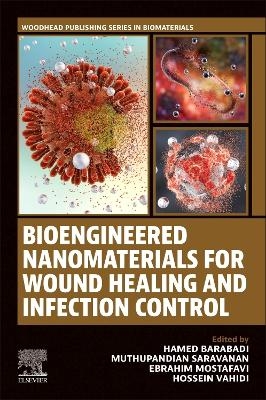
Bioengineered Nanomaterials for Wound Healing and Infection Control
Woodhead Publishing (Verlag)
978-0-323-95376-4 (ISBN)
Hamed Barabadi (PharmD, PhD) works as an assistant professor at the Department of Pharmaceutical Biotechnology, School of Pharmacy, Shahid Beheshti University of Medical Sciences, Tehran, Iran. He received a PhD degree from Shahid Beheshti University of Medical Sci-ences, Tehran, Iran, in 2019. He graduated as a Doctor of Pharmacy (PharmD) from Mazandaran University of Medical Sciences, Sari, Iran, in 2014. He owns to his credit a number of research papers, book chapters, and edited books with more than 3000 citations and h-index of 38. He has received many awards such as IET—Nanobiotech¬nology Premium Awards two times continuously in the years 2019 and 2020. Dr. Barabadi has been featured among the World’s Top 2% scientists list, according to a Stanford University study 2020 and 2022. He is the guest editor/editor for various reputed indexed journals such as Current Nanomedicine, Nanoscience and Nanotechnology-Asia, Frontiers in Pharmacology, MDPI International Journal of Molecular Sciences, MDPI Molecules, and a few other prestigious journals. His research interests lie in the area of pharmaceutical nanobiotechnology, ranging from green synthesis, characterization, and optimization of nanobiomaterials to their pharmaceutical potential evaluations, such as anticancer, antimicrobial, antioxidant, etc. Moreover, he has collaborated actively with researchers in several other disciplines of pharmaceutical sciences, particularly the nanoformulation of drugs for drug delivery systems and nanomedicine. Dr. Muthupandian Saravanan is currently a Professor in the Department of Pharmacology at Saveetha University, SIMATS, Chennai, India. He has a degree in Microbiology from Madurai Kamaraj University and a Doctorate with Specialization in Medical Microbiology and Nanomedicine from Sathyabama University, India. As a Post-Doctoral Researcher at the Hebrew University of Jerusalem, he studied nano-biomaterials and their biomedical applications. He later worked as Associate Professor, under the United Nation Development Program in Department of Medical Microbiology and Immunology at Mekelle University in Ethiopia. He has published papers in high impact journals such as the Lancet and Nature. He has participated in more than 75 national and international conferences and reviewed of more than 100 international peer-reviewed journals. He has served as guest editor/ co-editor for reputed PubMed and Scopus indexed journals. He has received many fellowships and awards, notably the IET- Nanobiotechnology premium Awards in 2019 and 2020. Dr. Ebrahim Mostafavi has so far received training at Stanford University School of Medicine (PostDoc), Northeastern University (PhD), Harvard Medical School (Researcher), and University of Tehran (MSc and BSc). His research interests revolve around the engineering and development of (nano)biomaterials, nanocarriers, and 3D in vitro models (hydrogels, 3D bioprinted constructs, nanofibrous scaffolds, organoids, vascular grafts, and microfluidic systems) to create biologically complex systems for a range of applications such as cancer diagnostics and therapeutics, tissue engineering and regenerative medicine, biosensing, and infectious diseases. Dr. Mostafavi serves as an associate editor-in-chief of several prestigious and high-impact journals within Elsevier, Springer, Cell Press, Dove Medical Press, T&F, Frontiers, and so on He is also an editorial board member of more than 30 impactful and prestigious biomedical and materials science journals. His scholarly work comprises more than 200 publications with an H-index of 36 (i10-index of 105), including papers published in The Lancet family (i.e., Oncology, Infectious Diseases, Public Health, and Global Health) journals. So far, he has edited several books such as “Pharmaceutical Nanobiotechnology for Targeted Therapy and “Emerging Nanomaterials and Nano-Based Drug Delivery Approaches to Combat Antimicrobial Resistance. He has also contributed to leading more than 45 introductory book chapters in a very multidisciplinary field of bio/medical engineering, biotechnology, nanotechnology, materials science, and regenerative/ translational medicine. Hossein Vahidi (PharmD, PhD) is a Professor and head of the Department of Pharmaceutical Biotechnology, School of Pharmacy, Shahid Beheshti University of Medical Sciences, Iran. He is currently head of the School of Pharmacy and Director-in-Charge of the Iranian Journal of Pharmaceutical Research (IJPR). His research interests lie in the area of bioprocessing and fermentation of microorganisms for the production of bioactive compounds, optimization of fermentation, and growth of industrial microorganisms.
1. An Overview of antimicrobial resistance and its mechanisms 2. An overview of wound healing: Wound types and current therapeutics 3. The role of biofilms and multidrug resistance (MDR) in wound infections 4. Wound healing and Nanotechnology: Opportunities and challenges 5. Nanotechnology-based therapeutics to combat biofilms and antibacterial resistance in chronic wound infections 6. Smart Nano-Systems for Wound Healing and Infection Control 7. Bioengineering of nanomaterials using biological resources: Biofabrication mechanisms, characterizations and biomedical applications 8. Bacteria-derived nanobiomaterials: Exploration of their wound healing, antimicrobial and biofilm inhibitory activities 9. Mycosynthesis of nanobiomaterials and their wound healing, antimicrobial and biofilm inhibitory activities 10. Bioengineering of nanomaterials using micro and macroalgae and their wound healing, antimicrobial and biofilm inhibitory activities 11. Phytonanotechnology: a greener approach for bioengineering of nanomaterials and their wound healing, antimicrobial and biofilm inhibitory activities 12. Bioengineered silver nanoparticles for antimicrobial therapeutics 13. Bioengineered gold nanoparticles for antimicrobial therapeutics 14. Green nanotechnology-based selenium and titanium dioxide nanomaterials for antimicrobial applications 15. Opportunities and challenges for bioengineered nanomaterials as future nanomedicine
| Erscheinungsdatum | 12.08.2023 |
|---|---|
| Reihe/Serie | Woodhead Publishing Series in Biomaterials |
| Sprache | englisch |
| Maße | 152 x 229 mm |
| Gewicht | 1000 g |
| Themenwelt | Medizin / Pharmazie ► Physiotherapie / Ergotherapie ► Orthopädie |
| Naturwissenschaften ► Biologie ► Mikrobiologie / Immunologie | |
| Technik ► Medizintechnik | |
| Technik ► Umwelttechnik / Biotechnologie | |
| ISBN-10 | 0-323-95376-X / 032395376X |
| ISBN-13 | 978-0-323-95376-4 / 9780323953764 |
| Zustand | Neuware |
| Informationen gemäß Produktsicherheitsverordnung (GPSR) | |
| Haben Sie eine Frage zum Produkt? |
aus dem Bereich


